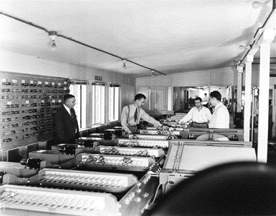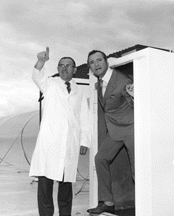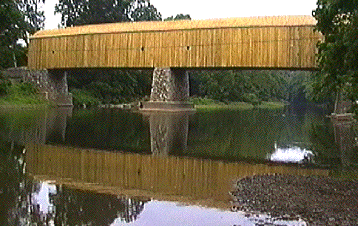Introduction:
Engineering as a Profession
This course deals not only with the impact
of technology on society but also with where technology comes
from and how it is shaped by society. This first unit focuses on
the development of the field of
engineering.

Mechanical
Differential Analyzer, UCLA
How is it different being an engineer today than
50
years ago? 150 years ago?
what kinds of things have changed?
How will the profession of engineering be
different
20 years from now?
How is what an engineer does different from what a
craftsperson does?
see Discussion
of Definitions for definitions
of:
- technology
- science
- engineering
Be careful to note that I am defining science
narrowly
as scientific laws, not as any kind of knowledge about the world.
What is a profession?
- do you expect professionals to behave
differently?
- what are the rights and responsibilities of
being a professional?
Definition: A profession (as opposed to other kinds
of
jobs) has three characteristics:
- its members have specialized knowledge
- they are certified in some way (usually by
other
members
of the profession--this kind of self-selection is
called
gatekeeping). Usually this is by licensing but in engineering it
is often just by graduating from an accredited engineering school
- they have a responsibility to serve the
public
good.
This means that they put the safety and welfare of the public before
their
own selfinterest or profits for their employer. Should engineers
be licensed?
Is engineering a profession?
How would Florman answer that question?
- are engineers heroes any more (see Florman
pp
2-3).
- what are the rewards of engineering besides
making money
(see Florman ch. 2)?

early
smog research at UCLA
This unit will focus on how engineering has changed
in the United States from the
late
1700s to the present. In general, before the civil war:
- With a couple of exceptions developed to
meet
military
needs, there were no engineering schools until the 1860s.
- Engineering was learned by apprenticeship
- there was not always a clear distinction
between
an engineer
and a mechanic
- most engineers were entrepreneurs--there
weren't
any large
businesses to work for
Quick survey of where we are going in the next week
or
two:
1. Compared to Europe, colonial and early
national
America lacked specialized engineering knowledge. In colonial
times
what we would call engineering projects were the product not of any
specialized
knowledge but of local ingenuity.
- before 1800, bridges were built by the local
carpenter,
and the canals built for water-powered grain mills or to carry boats
short
distances around rapids did not use much technology.
- larger projects were often designed and
managed
by local
businessmen or civic leaders (the first canal on the Merrimack at
Amoskeag
was build by a judge of common pleas) who had no experience--some
improvised
cleverly (local ingenuity), others kept things very simple.

Schofield
Ford Bridge , Pennsylvania, 1836
2. In the period from about 1800-1865
engineers
had specialized knowledge but they learned it by apprenticeship,
not by going to school. It was more hands-on knowledge, not
so much theory
or mathematical laws.
3. Starting about 1860 engineering schools were
built
in large numbers and engineers started to be trained in school and
learn
more theory. Engineering became more science-based.
this page written and copyright Pamela
E. Mack
last updated 8/24/2005

